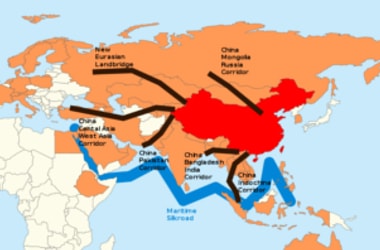
Boycotting OBOR - India's benefits and losses!
OBOR or the One Belt One Road Initiative has close to 70 countries and international organisations joining this US$ 8 trillion initiative. Consider the fact– China has an economy which is 5 times the size of India. It also has the world's fastest growth rate and forex reserves of US$3.5 trillion. But OBOR comes at a cost to Indo - China bilateral relations. The road cuts through Kashmir to connect Pakistan, threatening India’s sovereignty and counter-terrorism operations. India has consequently boycotted OBOR. The big question here is– will this have more benefits or losses for India? Let's see which side wins this battle for sovereignty vs economic growth.
Benefits 1. Rejecting the String of Pearls India has snubbed organisers of China's OBOR for trying to encircle us with ports surveillance posts and naval bases. This is known as the string of pearls. China engages in hostile activity and India is safeguarding its interests by not aligning with OBOR.
2. A Question of Sovereignty Challenging Beijing on OBOR and its continued support to China-Pak economic corridor passing through PoK is in line with India safeguarding its sovereignty. Honour of the nation and sovereignty are equally important through boycotting OBOR.
3. Opposing Illegal Corridor Gives India Credibility India was right to boycott the OBOR summit. Its key component, the China-Pakistan Economic Corridor (CPEC), is patently illegal. It passes through Pakistan-occupied Kashmir (PoK) on its way to Xinjiang in northwest China. PoK is not only illegally occupied by Pakistan; its people live under virtual dictatorship. India has benefit of credibility in opposing OBOR.
4. War on Terror China is selling OBOR as a $500 billion global project (with an initial corpus of $124 billion) that will transform the economies of the countries in Asia, Europe and Africa. It has pledged large infrastructure investments in India’s neighbourhood: US $57 billion to Pakistan, US $25 billion to Bangladesh and US $1.5 billion to Sri Lanka.China has pressed India to join the OBOR project knowing fully well it violates Indian sovereignty in PoK. The growing threat of terrorism from ISIS in Balochistan and PoK will be exacerbated by OBOR.
With ISIS migrating to Pakistan and Balochistan on fire, foreign investors, barring China, are wary of committing large funds to Pakistan.
5. No Transparency OBOR is not bona fide as New Delhi’s requests for consultations on the objectives, nature and financing of the BRI have been ignored. There are no economic gains for OBOR countries, only losses such as huge debts, usurious interest rates, bribing of political leaders and - once the government in question is sufficiently entangled - attempts to influence that country’s foreign policy, as seen in Sri Lanka. The project connects all countries to China, but no countries to each other beyond a certain point.
Losses 1. Mega Infrastructure Project OBOR is a mega infrastructure project offering benefits like instant connectivity, fast movement and skilled workers. Economic growth will expand as a result for those countries which align with OBOR. India is not one of them.
2. Record Unemployment India needs far more investment to create more jobs so that young working class individuals have the ability to be gainfully employed and not drift into antisocial or counterproductive activities.
3. Industrial Production Loses Out Boycotting OBOR has also ensured that India's industrial production does not get the fillip it needs to encourage savings, improve connectivity and enhance the rudiments of the welfare state. India cannot catch up with China unless it benefits from opportunities like OBOR.
4. Losing Out on Optimised Linkages The notion of linking Silk Road Economic Belt and oceanic Maritime Silk Road to optimize connections between Europe, Asia, Oceania and East Africa bridge the infrastructure gap and accelerate economic growth through Asia Pacific and Eastern Europe is visionary. India will lose out on the infrastructure boost that would have come from joining OBOR.
5. Manufacturing Sector Could Have Benefited Manufacturing capacity with other countries as a result of OBOR will improve their communication, foster P2P exchanges, G2G contacts, enhanced investment and greater trade and technology.
With the advent of the new Cold War and the Bamboo Curtain, Chinese officials and political mandarins have been playing a game of Chinese whispers with OBOR. OBOR has only losses and no gains, for a growing and economically as well as socially progressive nation like India. OBOR means aligning with China in flagrant violation of Indian sovereignty. This is completely unacceptable and OBOR must be opposed at all costs, if India wants to remain a peace abiding and strong world power. oted to ending terror and economic monopoly of Pakistan and China respectively.